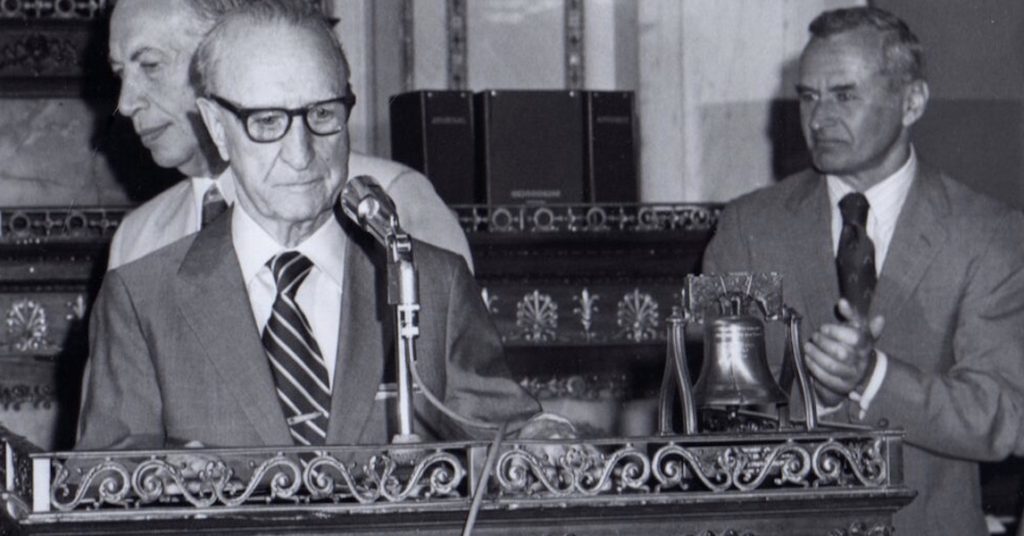As the President’s one-sided executive orders pile up, Republicans are decrying Democrats’ push back against his various appointments as, in the words of PA Senator Pat Toomey, “an unprecedented level of obstruction.”
Should Democrats acquiesce? Are they threatening the notion of good government?
Having just unearthed a transcript of a 1977 City Council ceremony honoring my grandfather, I’m wondering what he would think.
Michael J. Bradley represented Philadelphia’s Port Richmond neighborhood in Congress from 1937 to 1947. The son of Irish and Welsh immigrants, he quit high school to go to work, educated himself through voracious reading and made his way to the U.S. Capitol. After Congress, he stayed in public life in various capacities, prompting Council to honor him when he retired at age 80.
At that ceremony, he declared, “Government is compromise. Now that doesn’t mean you have to sacrifice principle; quite the contrary.” For him, compromise was a route you took within the larger map of your principles, on the way to the destination of the greater good.
My grandfather was no stranger to working alongside those with different views. An ardent New Dealer when Republicans ruled the city, he forged close friendships in Congress with many Republicans, including Everett Dirksen, later a conservative Senate power broker.
He stood for a government that didn’t just posture but actually worked. We need a government that works.
But I think the principles have to come first. What we’re seeing now isn’t about normal debate between parties. With a President who has no experience in government, and has shown little regard for its complexity or process, now is the time to stand for values and principles.
Under the banner of “America First” (a phrase tied to isolationism and anti-Semitism when my grandfather was in Congress), the new administration has repeatedly lied to the American people, taken steps to undercut healthcare at home and abroad, threatened to “take names” at the U.N. and closed borders to certain refugees and immigrants in a ban explicitly privileging one religion over others.
When my grandfather was honored for his service, his long-time friend Judge Sydney Hoffman lifted up the same qualities West did. “You’ve been a fighter for honesty and decency all your life,” Judge Hoffman told him. “You never backed down.” That’s what it meant, and must still mean, to be a leader in government.
These actions go against the values of our country and the principles of our government.
There is no compromising with lies about voter fraud, which undermine faith in our electoral process.
There is no compromising with a healthcare plan that offers only repeal with no vision for something better.
And there can be no compromising when the President closes the borders of a nation of immigrants in a blunt assertion of discrimination over reason.
At his inauguration the President pledged “We will make America strong again …wealthy again … proud again.” Since then he’s imposed restrictive controls on our borders and scientists, supported a proposed cabinet of billionaires and boasted of erroneous crowd sizes and victory margins. Posing as a populist, he’s operating as an authoritarian. That’s a deeply cynical manipulation of government of the people.
We have to ask: Strong in what way? Wealthy for whom? Proud of what?
Last week, at the same hotel where the President and GOP leadership gathered in solidarity two days before, I heard Harvard professor Cornel West speak. Quoting W.E.B. DuBois, he posed four challenges: “How shall integrity face oppression? What does honesty do in the face of deception? What does decency do in the face of insult? How does virtue meet brute force?”
Get More From Every Story
We include boxes in nearly every story to help you take action. Click the boxes below to see how you can make Philly better.
Integrity. Honesty. Decency. Virtue. The qualities heralded by DuBois and West, one writing in Reconstruction’s shadow, one speaking the day after the signing of the refugee ban, might not seem muscular enough for the times. But these civil rights advocates show that they can be the bedrock for principled resistance when the brute force of executive order and the deception from public podiums (and Twitter accounts) insult civic virtues and oppress the vulnerable.
When my grandfather was honored for his service, talk of legislative process took a back seat to principles. His long-time friend Judge Sydney Hoffman lifted up the same qualities West did. “You’ve been a fighter for honesty and decency all your life,” Judge Hoffman told him. “You never backed down.” That’s what it meant, and must still mean, to be a leader in government.
Integrity. Honesty. Decency. Virtue. An unprepared and autocratic administration threatens these principles. But they must stand as the pillars of our democratic practice. That’s how the people can trust that the government is for all of us. Only then can we even begin to consider the compromise my grandfather proposed.
By leaning into these pillars, and the wide spectrum of people for whom they can stand, we push back with power against the strength, wealth and pride of cynical forces that exploit patriotism to suppress decency, and populism to undercut the integrity of our democratic values.
David Bradley is a Philadelphia-based theater director, arts producer and educator specializing in how the arts combine with civic engagement.

